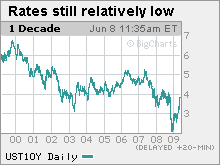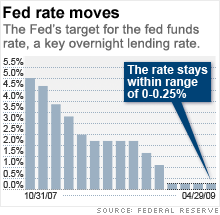Four is the loneliest number for bonds
The sharp rise in long-term interest rates is alarming, but they aren't high enough yet to choke off an economic recovery. But watch out if they head well above 4%.

 |
| The yield on the benchmark U.S. 10-year Treasury is nearing 4% for the first time in months. But rates are still well below levels they were at during the housing boom. |
| 30 yr fixed | 3.80% |
| 15 yr fixed | 3.20% |
| 5/1 ARM | 3.84% |
| 30 yr refi | 3.82% |
| 15 yr refi | 3.20% |

NEW YORK (CNNMoney.com) -- Long-term Treasury bond yields continue to creep toward 4%, a level they haven't traded at since mid-October. And that's raising an interesting "Is the glass half-full or half-empty" type of debate.
Is the recent surge in bond yields merely confirmation that the economy is starting to recover or will the increase in long-term interest rates imperil any chance of an economic rebound?
It probably depends on how much higher bond rates go.
Treasury prices have fallen sharply in the past few months, coinciding with the massive rally in stocks. Bond prices and yields move in opposite directions, so that has pushed rates on the benchmark U.S. 10-year Treasury up to about 3.9%, from a low of 2.04% in mid-December.
If the recession is really nearing an end, it would make sense that bond prices would fall. Investors should be more willing to bet on riskier assets such as stocks in a period of economic expansion and sell some of the bonds they had bought in a proverbial flight to quality rush.
Plus, rates were so low earlier this year due to fears that Citigroup (C, Fortune 500) and Bank of America (BAC, Fortune 500), among others, could be nationalized and that the economy was actually headed into another Depression.
Talkback: Are interest rates too high right now? Leave your comments at the bottom of this story.
So it may not be the case that investors are dumping bonds solely because of hopes of an economic rebound.
"Is the behavior in the Treasury market irrational? Does it represent that people are overly exuberant, or is it an orderly unwinding of the 'My God, the world is coming to an end' trade we had earlier this year? It's hard to disentangle the two," said Chris Probyn, chief economist with State Street Global Advisors in Boston.
What's more, rising yields are often a sign that the bond market is more focused on inflation. And while run-away inflation is something the Fed would like to avoid, a modest pickup in prices is usually associated with an economy on the mend.
Still, the spike in bond yields is a significant move in a short period of time. And it's a bit alarming because it has taken place despite the Federal Reserve's best efforts to keep a lid on rising interest rates.
The Fed lowered its key federal funds rate, an overnight bank lending rate, to near zero in December and has kept it there ever since. And the central bank announced in March it would start buying $300 billion in long-term Treasurys to keep long-term rates low, a phenomenon known as "quantitative easing."
The justification is that many believe the only way for the economy to truly get healthier again is for the housing market to get out of its funk. The direction of long-term yields tends to have an effect on mortgage rates.
Some fear that a nascent pickup in housing sales -- despite a continued slide in prices -- could come crashing to a halt if it suddenly becomes more costly for people to finance a home purchase.
And according to Bankrate.com, a Web site that tracks lending rates across the country, the average 30-year fixed rate mortgage is now 5.45% up from 5.23% a week ago and a record low of 4.85% in April.
"Keeping long-term rates as low as possible will help. I think the Fed will have some desire to keep the Treasury market from being trashed since that will take mortgage rates up higher with them," said Probyn.
Still, it's tough to argue just yet that mortgage rates have become too expensive. After all, a 10-year Treasury rate of just under 4% is usually not a cause for concern.
Rates bounced around between 4% and 5% for most of 2003 through 2006 and 30-year fixed mortgage rates were in a range of about 5% to 6% during that time -- the period when mortgages were readily available and housing prices soared.
"Is a 10-year Treasury rate of 3.84% catastrophic? No. If it goes substantially above 4% or 4.25%, then at some point rates would be too prohibitive," said Keith Hembre, chief economist for First American Funds in Minneapolis.
With that in mind, what's next from the Fed? Hembre thinks the central bank is unlikely to boost its Treasury purchase program to fight rates since that move appears to have backfired.
Even though buying Treasurys should drive rates down, there has been a glut of new Treasurys hitting the market in recent months to help finance the economic stimulus package and various Fed lending programs.
Investors are also worried about the inflationary impact of the Fed essentially printing money to buy the Treasurys in the first place.
"The Fed is in a bit of a box. Part of the rise in yields has been because the market is looking at quantitative easing as inflationary," Hembre said. "If the Fed steps up the Treasury purchases, it's not clear that will bring yields down because the purchases would be counteracted by a further increase in inflation expectations."
In addition, the increase in Treasury yields has not led to a substantial surge in rates for other types of loans, such as corporate bond rates and student loans, said Tom Higgins, chief economist with Payden & Rygel, a Los Angeles-based money management firm. So that probably gives the Fed some breathing room to sit tight.
"The back up in rates has been marginal. It is having an impact on refinancing activity and, if sustained, will have a bigger impact on new home purchases. But outside of housing, it hasn't had a major impact. So I don't think it will concern the Fed that much yet," he said.
Higgins thinks that rates will "self-correct" and eventually head lower again once it becomes clearer to investors that the economic recovery will be less robust and take place more gradually than many people think.
That all adds up to a scenario where rates probably won't skyrocket much higher. In some respects, that's a good thing. While rates have rebounded because of a belief that the economy is getting better, if they keep surging, that could put the recovery at risk.
Yet at the same time, a pullback in rates would signal what people might not want to readily admit: that the climb out of this recession is neither going to be quick nor easy.
"The economy has come out of free-fall mode. It's going down but not as fast. We might stabilize in the third quarter and possibly return to growth in the fourth quarter. But it's going to be a long, muted recovery," Probyn said.
Talkback: Do you think mortgage rates and other loan rates are too high right now? ![]()

